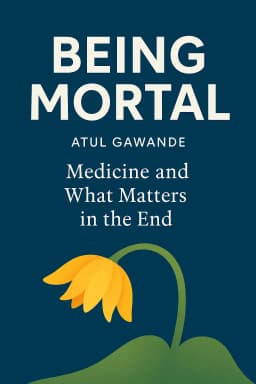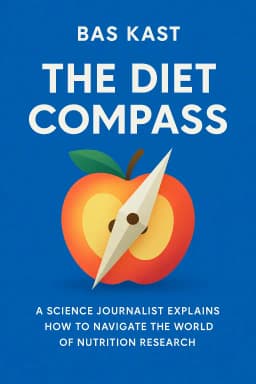
More Deadly Than War
The Unmentionable World of Human Waste and Why It Matters
Golden Hook & Introduction
SECTION
Laura: Alright, Sophia, quick pop quiz. What kills more people every year than war, terrorism, and malaria combined? Sophia: Oh boy, that’s a heavy start. More than war? I’m thinking it has to be a disease, maybe something like heart disease or cancer on a global scale? Laura: A good guess, but no. It's not a super-virus. It's something far more mundane, something we do every day and absolutely refuse to talk about. It’s the simple, deadly lack of a safe toilet. Sophia: Wait, really? A toilet? That can’t be right. That’s staggering. Laura: It is. And it’s the central, explosive fact at the heart of the book we’re diving into today: The Big Necessity: The Unmentionable World of Human Waste and Why It Matters by Rose George. Sophia: The Big Necessity. I love that title. It’s so direct. Laura: It is, and Rose George is the perfect person to write this. She's not a public health academic; she's a British journalist and former war correspondent who's been everywhere from Kosovo to Saddam Hussein's birthday party. She brings that same fearless, investigative lens to a topic most of us would rather just flush and forget. Sophia: A war correspondent tackling toilets. That actually makes a strange kind of sense. You’d need to be pretty unflinching. So where do we even start with a problem that big? It feels overwhelming. Laura: We start where the author starts: with a moment of profound, personal, and slightly humiliating culture shock. It’s a story that perfectly frames the entire global divide on this issue.
The Unmentionable Crisis: Why Sanitation is a First-World Blind Spot
SECTION
Laura: George is in a small town in the Ivory Coast, a place filled with Liberian refugees. It’s a spartan setting. She’s in a little restaurant and needs to use the bathroom. So she asks the young Liberian waiter where it is. Sophia: Okay, a simple enough request. Laura: You'd think. He points her to a bare, concrete room. There’s nothing in it. No toilet, no hole in the ground, nothing. She’s confused, so she goes back to him and asks if she’s in the right place. And the waiter just looks at her, laughs, and says the line that kicks off the whole book. Sophia: What did he say? Laura: He says, "Do it on the floor. What do you expect? This isn’t America!" Sophia: Wow. That one line just says everything about privilege and our baked-in assumptions, doesn't it? The sheer audacity of expecting a toilet. Laura: Exactly. It’s a punch to the gut. For 2.6 billion people on this planet—that’s four in ten people—having nowhere to go is the daily reality. George uses that moment to make us understand that for most of the world, a clean, private toilet isn't a right. It's a staggering luxury. Sophia: And the health consequences must be just as staggering. We’re talking about diseases, right? Laura: We're talking about what the author bluntly calls "shit-related diseases." A single gram of feces can contain 10 million viruses and a million bacteria. And when there's no sanitation, that gets into the water, the food, everything. Diarrhea, a disease we treat with Gatorade, kills a child every fifteen seconds. It’s a weapon of mass destruction that we’ve just decided to ignore. Sophia: That is horrifying. But it’s easy for us, sitting here, to think of this as a problem happening far away, in refugee camps or poor rural villages. Laura: And that is the book's first great myth-busting moment. George argues this isn't just an 'over there' problem. She immediately pivots to the places we think are perfectly safe. Take Galway, Ireland, in 2007. A beautiful, modern, European city. Sophia: Right, a tourist destination. Cobblestone streets, university, the whole thing. Laura: People started getting violently ill with persistent stomachaches and diarrhea. It was a massive outbreak of a parasite called cryptosporidium. At first, they blamed farm runoff, the cows. But the real culprit was the city's own sewage. The treatment plant was failing, and it was pumping parasite-infested effluent right back into the lake that supplied the city's drinking water. Sophia: Oh, that’s grim. So what happened? Laura: For five months, a wealthy, developed city had to live like one of the world's worst slums. They had to boil every drop of water. It was a complete system failure, a reminder that the sophisticated infrastructure we rely on is often hanging by a thread. Sophia: But that must be a one-off, right? A fluke? An exception that proves the rule? Laura: You would hope so. But then she brings up Milwaukee, 1993. The biggest water-contamination outbreak in U.S. history. Same parasite, cryptosporidium, from the city's own sewage getting into its drinking water source, Lake Michigan. It made 400,000 people sick and killed more than 100 Americans. Sophia: A hundred people died? In America? From their tap water? How is that not a bigger story? Laura: Because we don't want to talk about it! It’s the ultimate taboo. We want to believe that when we flush, the problem magically disappears. George calls it a system based on "presumption." We presume it's being handled. But often, it's just being moved. Even today, a huge portion of the world's sewage, including from developed nations, ends up untreated in our rivers, lakes, and oceans. The problem we think is solved is actually right under our feet, and sometimes, it comes bubbling right back up. Sophia: Okay, so our systems are more fragile than we think. It makes you wonder about the people who actually keep them running. Who are these invisible workers who stand between us and a city-wide cryptosporidium outbreak?
The Unsung Heroes and Hidden Worlds
SECTION
Laura: That's the next brilliant part of the book. George takes us from the macro-crisis into the hidden world of the people who manage our waste. She goes down into the sewers of London with the "flushers," the modern-day wastewater operatives. Sophia: That sounds… intense. What’s it like down there? Laura: It's a different universe. It's dark, it smells, and it's incredibly dangerous. You're dealing with a cocktail of bacteria and viruses that can cause hepatitis or leptospirosis. There are poisonous gases like methane and hydrogen sulfide that can kill you in seconds. And the biggest danger is the flow itself. A sudden rainstorm can turn a trickle into a raging torrent that will sweep you away. Two workers in Minnesota drowned that way. Sophia: So these are genuinely life-and-death jobs that we never even think about. Laura: And they find the most unbelievable things down there. George tells this one incredible story from a senior engineer named Rob Smith. His crew is working in a sewer near Greenwich, and one of the flushers finds this filth-encrusted lump and hands it to him. Sophia: Please don't say it's what I think it is. Laura: It was a hand grenade. Sophia: Come on. A hand grenade? In a sewer? How does that even happen? Laura: Nobody knows! But Smith, an ex-military guy, recognizes it. He realizes it could be live. He has to calmly tell his entire crew to get out, then he climbs the ladder, holding a live grenade, and lobs it down an embankment where it won't hurt anyone. The police later confirmed it was dangerous. Sophia: That's a movie scene! These guys are basically bomb disposal experts, but for… everything else. They are true unsung heroes. Laura: Absolutely. And George juxtaposes that world of grit and danger with its complete opposite. From the grimiest job on earth, she takes us to the most pristine, hyper-designed sanitation environment imaginable: Japan. Sophia: Ah, the famous Japanese robo-toilets! I’ve heard legends. Laura: They are real, and they are spectacular. The book explores the TOTO Washlet, which is more of a personal hygiene appliance than a toilet. It has heated seats, a built-in bidet with adjustable water pressure and temperature, a warm air dryer, and even automatic deodorizers. In Japan, more households have a Washlet than a computer. Sophia: That's wild. It’s like the Apple approach to toilets. They turned a basic utility into a desirable, high-end consumer product. How did they pull that off? Laura: Through brilliant, and sometimes bizarre, marketing. In the 1980s, TOTO was competing with another company, Inax. They both had similar products. TOTO hired a popular, quirky actress named Jun Togawa. Their ads featured her standing next to a toilet, looking at the camera, and saying, "Even though it's a bottom, it wants to be washed, too." Sophia: (laughing) That is so direct and so perfect. What did the other company do? Laura: This is the best part. Inax, their competitor, responded with an ad campaign featuring a man in a gorilla suit sitting on a toilet. Sophia: A gorilla? What were they thinking? What was the message? Laura: Nobody knows! Even the Inax employees couldn't explain it. And, unsurprisingly, TOTO's campaign was a massive success, and the gorilla flopped. TOTO won the toilet wars. It's a hilarious story, but it proves a powerful point: with the right cultural framing and marketing, you can take the most private, unmentionable object and make it a status symbol. You can change a society's relationship with the act itself. Laura: Exactly. It's about changing minds. And that's the key to solving the crisis in places that don't have billions for high-tech toilets. Because as George shows, the top-down, government-led solutions have often failed spectacularly.
The Revolution from the Ground Up
SECTION
Sophia: What do you mean by failed? Don't governments in places like India have programs to build toilets for people? Laura: They do. For decades, the model was to provide subsidies and build concrete latrine blocks. But it was a disaster. The toilets were often poorly designed, had no water supply, or didn't fit the cultural habits of the people. So they went unused. They became goat sheds or storage closets. The government was measuring success by the number of toilets built, not by whether anyone was actually using them. Sophia: So you have these ghost toilets, while the underlying problem isn't solved at all. Laura: Worse. To understand the true human cost of this failure, George takes us to rural India and introduces us to the world of "manual scavengers." This is a practice, rooted in the caste system, where people from the Dalit or "untouchable" caste are forced to clean dry latrines by hand. Sophia: By hand? You mean, literally… Laura: Literally. They scrape human excrement out of pits with tin plates and their bare hands, and carry it away in baskets on their heads. It's illegal, but it persists. George interviews a woman named Champaben, who is resigned to her fate. She says, "Our caste is written on our forehead. Ours is low and yours is high. That’s the way it is." Sophia: That's a level of injustice that's hard to even comprehend. It’s a human rights catastrophe hidden in plain sight. So if building toilets for them doesn't work, what does? Laura: This is where the book finds hope, in one of the most counter-intuitive and brilliant public health strategies I've ever heard of. It's called Community-Led Total Sanitation, or CLTS, pioneered by a man named Kamal Kar. Sophia: Okay, what did he do differently? Laura: He went into a village in Bangladesh that had a terrible sanitation problem, and he didn't bring a single brick or a bag of cement. He didn't offer any subsidies. Instead, he gathered the villagers and took them on what he called a "walk of shame." Sophia: A walk of shame? Laura: He had them walk through the fields and along the paths where everyone defecated in the open. Then, he had them draw a map of their village and mark all the spots where there was human waste. Finally, he had them do a simple calculation: how many people, how much waste per day, and where does it all go when it rains? They quickly realized it was going into their wells, their ponds, onto the vegetables in their gardens. He got them to calculate how much of their neighbors' feces they were likely ingesting every day. Sophia: Oh my god. He used disgust as a weapon for public health? That is brilliant and kind of horrifying. Laura: It was a moment of collective, horrified realization. The villagers were so ashamed and disgusted that, on the spot, they vowed to become "open defecation-free." They organized themselves, dug their own pits, and built their own simple, low-cost latrines, with no outside money. They did it because their dignity demanded it. The solution wasn't technology dropped from on high; it was a psychological trigger that sparked change from within.
Synthesis & Takeaways
SECTION
Laura: And that's the book's ultimate, powerful insight. We in the West think the solution to the world's problems is always technology—more pipes, bigger treatment plants, fancier toilets. But Rose George travels the globe and shows us that, so often, the real solution is psychology. Sophia: It’s not about the hardware; it’s about the human software. Laura: Precisely. It’s about overcoming shame, as TOTO did in Japan. It’s about recognizing the hidden heroism of the flushers in London. And it's about creating dignity and sometimes, as we just saw, weaponizing disgust to save lives in India. The sanitation crisis isn't just an infrastructure problem; it's a profoundly human problem. Sophia: It makes you look at the simple act of flushing a toilet completely differently. It's not an endpoint; it's the start of a massive, hidden, and often heroic journey that connects us all. The book is widely acclaimed, but some readers have noted it focuses heavily on India and Asia. After hearing these stories, do you think that's a fair critique? Laura: I think it's a valid observation, but George's point is that these stories, whether from India or Japan, reveal universal truths. The book's power lies in showing that the principles of dignity, shame, and community are the real levers of change, no matter where you are. The book’s legacy isn’t just about documenting a problem; it’s about changing how we think. Sophia: It certainly changed how I think. That story about the SARS outbreak in the Amoy Gardens apartment block, spread through faulty plumbing, feels especially chilling today. It’s a stark reminder that sanitation isn't a niche issue; it’s a matter of global health security. Laura: It is. And it all comes back to breaking the silence. As one sanitation activist in the book says, "Just as HIV/AIDS cannot be discussed without talking frankly about sex, so the problem of sanitation cannot be discussed without talking frankly about shit." Sophia: A powerful and necessary truth. It makes me think, what's the one thing from today's discussion that will stick with you the most? For me, it’s that image of the villagers calculating their own fecal consumption. A horrifying, but unforgettable, catalyst for change. We'd love to hear what sticks with you. Let us know your thoughts and join the conversation on our social channels. Laura: This is Aibrary, signing off.









